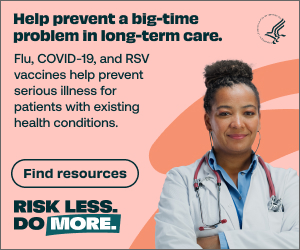|
E-Newsletter • October 2024 |
▼ ADVERTISEMENT

Editor's E-Note
A new FDA regulation went into effect in September calling for all mammography facilities in the United States to let their patients know the status of their breast density. The American College of Surgeons National Accreditation Program for Breast Cancer also requires accredited centers to notify and educate patients. Radiologists on its board offer information to educate women about what breast density is and why it’s important for them to be aware of their levels.
In addition to reading our e-newsletter, be sure to visit Today’s Geriatric Medicine’s website at www.TodaysGeriatricMedicine.com, where you’ll find news and information that’s relevant and reliable. We welcome your feedback at TGMeditor@gvpub.com. Follow Today’s Geriatric Medicine on Facebook and X, formerly known as Twitter, too.
— Kate Jackson, editor |
|
|
| In This E-Newsletter
|
▼ ADVERTISEMENT
 |
|
|
Four Things to Know About Breast Density
Last month, a new FDA regulation went into effect requiring all mammography facilities in the United States to notify women of their level of breast density. Although many centers have already been doing this for several years, the FDA regulation expands the requirement to all breast centers across the country.
With the new regulation, many women may have questions about what exactly breast density is and how it impacts their risk of developing breast cancer. The American College of Surgeons National Accreditation Program for Breast Centers (NAPBC) standards, revised last year to emphasize individualized patient care, also require accredited centers to notify and educate patients on breast density, emphasizing the opportunity for collaboration between radiologists and surgeons. Radiologists on the NAPBC board offered insight into what women should know about breast density and why it matters.
|
▼ ADVERTISEMENT

Why Physicians Should Care About Information Blocking Rules
The Department of Health and Human Services Office of the Inspector General now plans to investigate physician practices that violate the information blocking rule stemming from the 21st Century Cures Act. The American Medical Association discusses the consequences and details what physicians need to do.
Dementia Care Pathways
In a scoping review published in BMC Geriatrics, researchers addressed the dearth of information about dementia care pathways and their use and outcomes, concluding that people with dementia and care partners can be involved in the development and implementation of such care pathways to ensure the impact on their lived experience is reflected.
Cognitive Decline After a Spouse’s Cardiovascular Disease Event
MedPage Today reports on a study by Japanese researchers of men’s increased risk of developing dementia after incident cardiovascular disease in a spouse.
Ageism Persists in Medicine
In an interview, Andrew Steward, an assistant professor of social work in the Helen Bader School of Social Welfare at the University of Wisconsin-Milwaukee and author of a paper on age discrimination in health care, discusses ingrained ageism among health care professionals. |
Social Worker Safety
KATANA Safety offers a personal safety device that attaches to frontline workers’ smartphones so it’s always with them and never needs charging, helping protect home-based health care professionals from being attacked, injured, or even killed. The quick-trigger activation bypasses the phone’s lock screen and provides workers with instant help 24/7. Learn more »
AI Guide
AI Agents for Healthcare, an eBook from Cognigy, offers a guide to the ways artificial intelligence is revolutionizing the delivery of patient care and the management of operations. Learn more » |
|
|
COVER STORY
The Power of Protein
Adequate protein can help prevent loss of muscle mass and keep a healthy immune system. Optimize older adults’ protein intake to help them maintain robust status.
FEATURE
Essential Tremor and Dementia
Studies have found that essential tremor can have cognitive impacts and raise the risk of dementia. Here’s what clinicians should know about the link between these two conditions.
|
|
|
| Advertising Opportunities |
Have a product or service you want to market to geriatric care professionals? Utilize the reach of Today's Geriatric Medicine Magazine to accomplish your marketing goals. Email our experienced account executives today at sales@gvpub.com or call 800-278-4400 for more information.
|
| © 2024 Today's Geriatric Medicine Magazine |
|
|